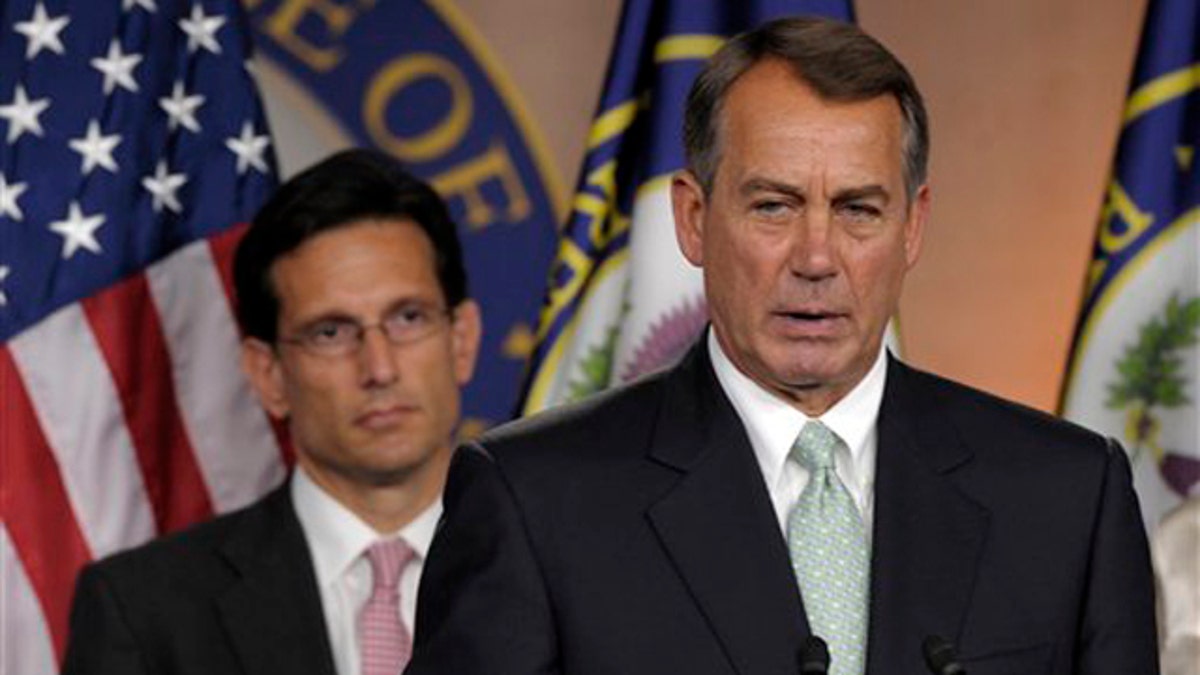
House Speaker John Boehner, right, speaks during a news conference with House Majority Leader Eric Cantor on Capitol Hill in Washington July 15. (AP)
The debate over the debt ceiling moves Monday from the backrooms of the White House to the halls of Congress, as the House and Senate take up dueling measures to grapple with the problem.
Though the White House says the president still wants a "big" deficit-reduction deal linked to a debt-ceiling increase, a solid week of bipartisan talks yielded nothing close to a compromise -- leaving members of Congress instead moving on to a couple of risky proposals.
House Republicans will act first, pushing their "cut, cap and balance" plan at a committee hearing late Monday afternoon. That plan would cut spending immediately and cap future spending as a percentage of GDP, while requiring Congress to pass a balanced-budget amendment as a condition for raising the debt ceiling by $2.4 trillion.
Democrats, though, roundly oppose that proposal and insisted Sunday that it will die in the Senate.
As an alternative, Senate Republican and Democratic leaders are polishing a fallback plan that would allow President Obama to win an incremental and immediate debt-ceiling increase, while effectively requiring a two-thirds majority vote in Congress to stop him. It could be accompanied by more moderate spending cuts and the creation of a new commission to target future deficit reduction.
Congressional leaders describe it as a last-ditch effort to steer the country away from default, though one looking increasingly more viable as efforts to craft a bipartisan compromise run into partisan disagreement.
However, congressional conservatives are voicing their displeasure with the fallback and some say they will try to torpedo it should it come to fruition on the floor. Rep. Jim Jordan, R-Ohio, head of the conservative Republican Study Committee, said Sunday that his colleagues will oppose it.
"It's abdicating our responsibility," Rep. Michael Grimm, R-N.Y., told Fox News, without saying how he might vote on the measure if it's the only option. Grimm is among the House Republicans pushing the cut, cap and balance plan as the way to rein in the debt and deficit.
"We cannot just continue to spend money we don't have," Grimm said Monday. He said that if the country manages to avoid default by raising the debt ceiling, the U.S. still faces that prospect down the road if it doesn't cut spending since a future credit downgrade could make it impossible for Washington to pay all its bills.
Top rating agencies already have warned that the U.S. could face a downgrade if it doesn't raise the debt ceiling and reduce the deficit. Moody's, one of those agencies, reportedly suggested in a report Monday that the country just eliminate its debt ceiling to avoid the recurring uncertainty.
White House budget director Jack Lew said in interviews Sunday that it's not too late to strike a significant deal between the parties.
"There's still time to get something big done," Lew said on NBC's "Meet the Press."
On still another track, Sen. Tom Coburn, R-Okla., plans to pitch a proposal Monday that he claims can yield $9 trillion in savings over the next decade. But, speaking on CBS' "Face the Nation," he said, "I wouldn't expect it to pass."




